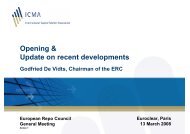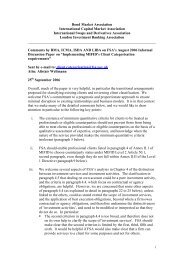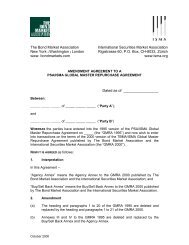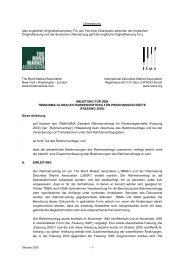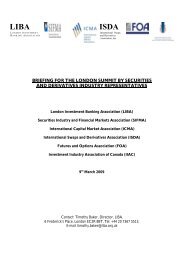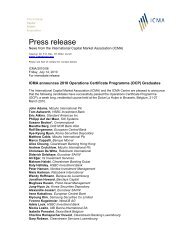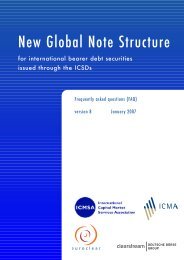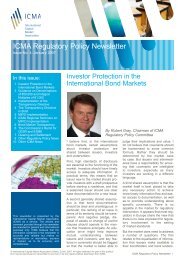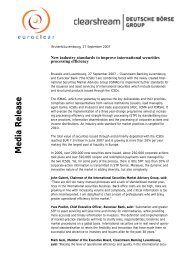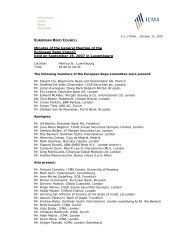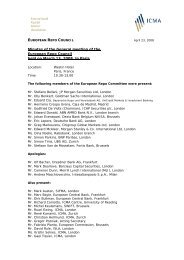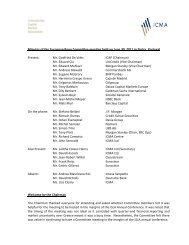Issue no. 22: ICMA Regulatory Policy Newsletter
Issue no. 22: ICMA Regulatory Policy Newsletter
Issue no. 22: ICMA Regulatory Policy Newsletter
Create successful ePaper yourself
Turn your PDF publications into a flip-book with our unique Google optimized e-Paper software.
document, include the methodology for assessing systemic<br />
importance, the additional required capital – ranging from<br />
1% to 2. 5% of extra common equity against risk weighted<br />
assets – and the arrangements by which they will be phased<br />
in. The GHOS is submitting this consultative document to<br />
the FSB, which is coordinating the overall set of measures<br />
to reduce the moral hazard posed by global systemically<br />
important financial institutions. This package of measures<br />
will be issued for consultation in late July.<br />
The BIS has also an<strong>no</strong>unced that the GHOS has appointed<br />
Stefan Ingves, Gover<strong>no</strong>r of Sveriges Riksbank (Sweden’s<br />
central bank), as the new Chairman of the Basel Committee<br />
on Banking Supervision. Mr Ingves succeeds Nout Wellink.<br />
In its media release of 20 April, IOSCO reported the<br />
opening of its Annual Conference public sessions, focusing<br />
on the themes of securities regulators and systemic risk,<br />
the challenges of debt markets, international corporate<br />
governance and consumer education. The public conference<br />
came at the conclusion of IOSCO’s private meetings which<br />
have resulted in the decision by the Presidents’ Committee to<br />
approve a new organisational structure and funding basis.<br />
IOSCO also published a briefing <strong>no</strong>te outlining the decisions<br />
reached at this year’s Annual Conference. This covers<br />
points on Strategic Direction; Objectives and Principles; the<br />
Multilateral Memorandum of Understanding (MMoU); the<br />
Initiative to Raise Standards of Cross-Border Cooperation;<br />
New Work Mandates (in relation to the Emerging Markets<br />
Committee); the SRO Consultative Committee; and Reports<br />
approved for publication.<br />
It also reports on appointments made during the Conference.<br />
These include that of Maria Helena Santana, Chairperson of<br />
the Comissão de Valores Mobiliários (CVM) of Brazil, who<br />
has been appointed Chairman of the Executive Committee<br />
to replace Jane Diplock AO, Chairman of the New Zealand<br />
Securities Commission, who has stepped down; and that<br />
of Masamichi Ko<strong>no</strong>, Vice-Commissioner for International<br />
Affairs, Financial Services Agency of Japan who has been<br />
appointed Chairman of the Technical Committee to replace<br />
Hans Hoogervorst, Chairman of the Netherlands Authority<br />
for the Financial Markets (AFM), who has stepped down.<br />
It has also been reported that Liechtenstein has become the<br />
newest IOSCO member; and that nine securities regulators<br />
are to join IOSCO’s fight against cross border market<br />
misconduct, having been invited to become full signatories<br />
of the IOSCO MMoU.<br />
Contact: David Hiscock<br />
david.hiscock@icmagroup.org<br />
Crisis management<br />
In March, <strong>ICMA</strong> submitted a response to the European<br />
Commission in respect of its “bail-in” consultation (those<br />
questions laid out in Annex A of its crisis management<br />
consultation). The European Commission has <strong>no</strong>w made<br />
available information regarding the responses it received<br />
to this consultation, which can be found through the<br />
Commission’s crisis consultation web page. In the overview<br />
of the results the portion relating to “bail-in” is section 8 (on<br />
pages 19-23). In the list of answers (working document) the<br />
portion relating to “bail-in” starts on page 34 and ends on<br />
page 45 (covering consultation questions 62-68).<br />
The technical details and the responses received will contribute<br />
significantly to the development of draft legislation for a<br />
comprehensive crisis management framework for banks and<br />
investment firms intended to be tabled in September.<br />
The IMF published a staff discussion <strong>no</strong>te dated 27 May<br />
which is entitled The Too-Important-to-Fail Conundrum:<br />
Impossible to Ig<strong>no</strong>re and Difficult to Resolve. This reviews the<br />
too-important-to-fail (TITF) problem and considers whether<br />
current policy proposals will resolve it. In summary this paper<br />
states the following conclusions and policy implications:<br />
•<br />
<strong>no</strong> private financial institution should be viewed by markets<br />
as being too important to be allowed to fail;<br />
• policies are therefore needed to address the systemic risk<br />
posed by institutions perceived as TITF and to reinstate<br />
market discipline;<br />
• these policies should be accompanied by certain key<br />
elements to reinforce their effectiveness and limit their<br />
unintended consequences;<br />
•<br />
REGULATORY RESPONSE TO THE CRISIS<br />
although clear progress has been made in some of these<br />
areas, tangible results are needed on a number of issues;<br />
• these complex issues have been under intensive discussion<br />
for many months within international forums, and they<br />
involve difficult policy judgments; and<br />
• in the interim, a subset of the measures that are simple<br />
and straightforward could be implemented internationally<br />
on a consistent basis.<br />
<strong>ICMA</strong> <strong>Regulatory</strong> <strong>Policy</strong> <strong>Newsletter</strong> Third Quarter 2011 | 10




